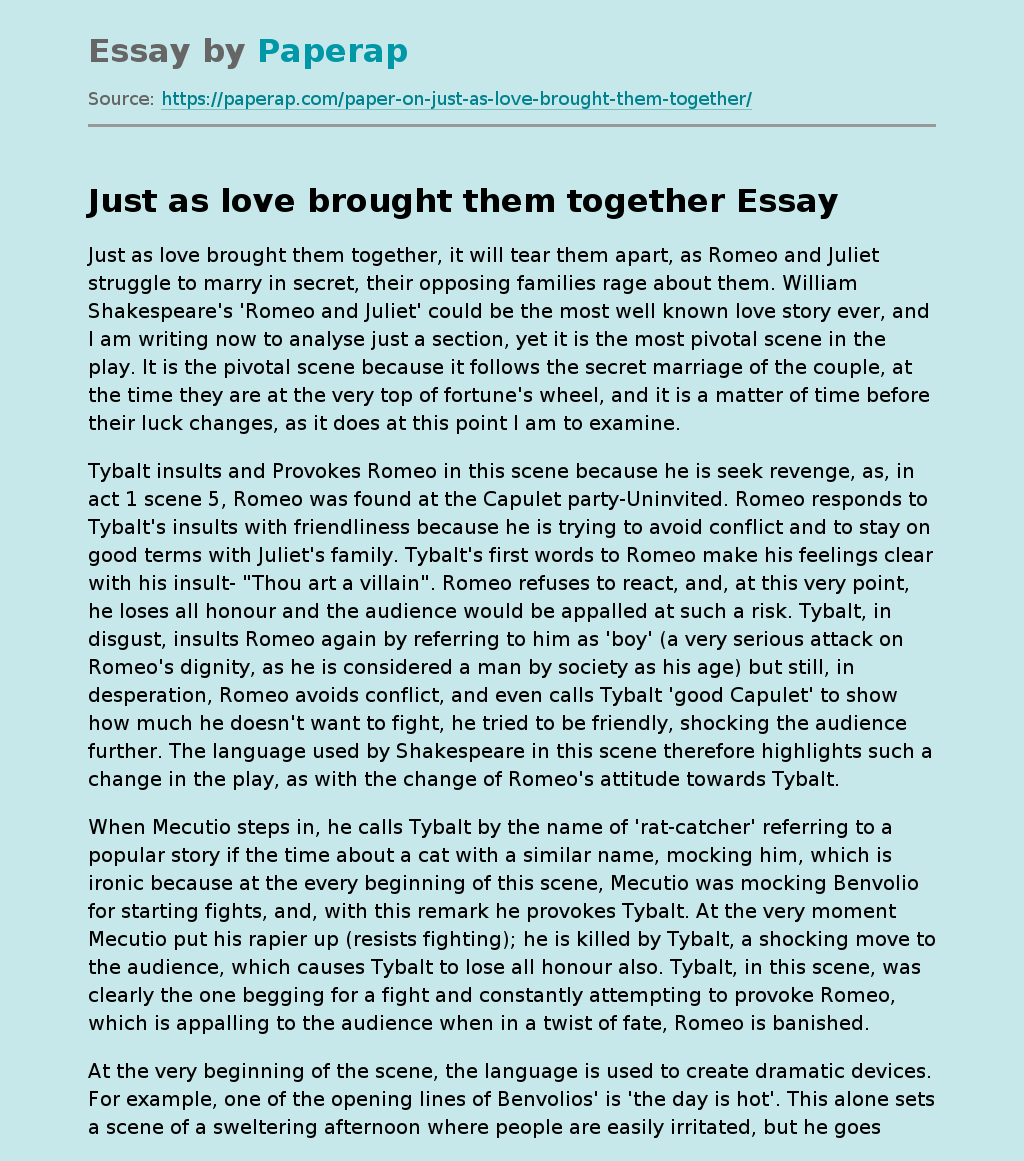"Romeo and Juliet" by William Shakespeare
Just as love brought them together, it will tear them apart, as Romeo and Juliet struggle to marry in secret, their opposing families rage about them. William Shakespeare’s ‘Romeo and Juliet’ could be the most well known love story ever, and I am writing now to analyse just a section, yet it is the most pivotal scene in the play. It is the pivotal scene because it follows the secret marriage of the couple, at the time they are at the very top of fortune’s wheel, and it is a matter of time before their luck changes, as it does at this point I am to examine.
Tybalt insults and Provokes Romeo in this scene because he is seek revenge, as, in act 1 scene 5, Romeo was found at the Capulet party-Uninvited. Romeo responds to Tybalt’s insults with friendliness because he is trying to avoid conflict and to stay on good terms with Juliet’s family. Tybalt’s first words to Romeo make his feelings clear with his insult- “Thou art a villain”.
Romeo refuses to react, and, at this very point, he loses all honour and the audience would be appalled at such a risk.
Tybalt, in disgust, insults Romeo again by referring to him as ‘boy’ (a very serious attack on Romeo’s dignity, as he is considered a man by society as his age) but still, in desperation, Romeo avoids conflict, and even calls Tybalt ‘good Capulet’ to show how much he doesn’t want to fight, he tried to be friendly, shocking the audience further.
The language used by Shakespeare in this scene therefore highlights such a change in the play, as with the change of Romeo’s attitude towards Tybalt.
When Mecutio steps in, he calls Tybalt by the name of ‘rat-catcher’ referring to a popular story if the time about a cat with a similar name, mocking him, which is ironic because at the every beginning of this scene, Mecutio was mocking Benvolio for starting fights, and, with this remark he provokes Tybalt. At the very moment Mecutio put his rapier up (resists fighting); he is killed by Tybalt, a shocking move to the audience, which causes Tybalt to lose all honour also. Tybalt, in this scene, was clearly the one begging for a fight and constantly attempting to provoke Romeo, which is appalling to the audience when in a twist of fate, Romeo is banished.
At the very beginning of the scene, the language is used to create dramatic devices. For example, one of the opening lines of Benvolios’ is ‘the day is hot’. This alone sets a scene of a sweltering afternoon where people are easily irritated, but he goes on, ‘if we meet we shall not escape a bout’ which is a clear indication to the audience of the feud to come. Benvolio’s speech ends with ‘…The mad blood stirring’ which, more and more hints of the danger to keep the audience at the edge of their seats (if, at that time, they were rich enough to afford them). Therefore, at this starting point of the scene, it is Benvolio that first narrates the setting, which is a particularly helpful technique if the set of the stage doesn’t make it obvious enough to the audience.
The verbal abuse Tybalt uses to provoke Romeo would’ve had quite an impact on the audience. The insults used, such as ‘boy’ and ‘villain’ were extreme, as at that time a person of his age was considered a man by society and Tybalt publicly strips him of this title without any resistance from Romeo.
Shortly after this, Mecutio is stabbed and he makes this clear to the audience with a short, simple and shocking sentence which carries a lot of impact- ‘I am hurt’. This is followed by the appalling curse ‘A plague on both your houses’. This has such an impact on the audience because when this was written, people were very superstitious and would have seen this as a sure sign that Romeo’s luck was about to change. The phrase is repeated over and over for even more effect. Romeo pursues Tybalt after the audience have been given this clear warning, which would intrigue them into the belief it will not end well. Romeo kills Tybalt, and, as he notices the possible consequences of his actions and the sudden cruel twist of fate his life is undergoing, he calls out ‘I am fortunes fool!’ This is true as over the past few moments of that scene, Romeo’s fortune wheel has changed completely and all that follows that point is negative.
I believe that all three characters-Romeo, Mecutio and Tybalt are responsible for the fight and trouble caused by it. I believe this because the all added to the fray in their own manner. Firstly, Romeo crashed the Capulet’s Party in Act 1 Scene 5, angering Tybalt in the first place, then, when Tybalt came to Romeo to get the fight he wanted, Romeo wouldn’t stand up for himself, worsening the situation and so Tybalt eventually dishonourably kills Mecutio, and, in anger, Romeo runs off to find him and exact his revenge. Each character, as you can see, worsens each others feelings and provokes the outcome of the scene.
As a result of this scene, the entire play from this point onwards spirals downward into a depressing end for all characters included. It is a clearly pivotal scene, as explained because everything changes for the worst at this point in the play as, at the beginning Romeo and Juliet were at the top of fortunes wheel destined to descend.
"Romeo and Juliet" by William Shakespeare. (2018, Dec 25). Retrieved from https://paperap.com/paper-on-just-as-love-brought-them-together/

